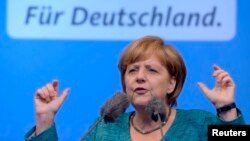LONDON —
German Chancellor Angela Merkel has played down speculation that Greece could get a second debt writedown, saying that could destabilize the eurozone. But some analysts say a debt writedown might be exactly what's needed to keep the euro zone on track to recovery.
Merkel held the chancellor's annual summer news conference Friday, giving her an important opportunity to address the media just months before Germans vote in the September federal election.
Europe's ongoing debt crisis is a major campaign issue and Greece was one of the main topics.
Speaking to reporters, she repeated her view that she does not see a debt "haircut" for Greece.
On Thursday the German finance minister was in the Greek capital Athens and came bearing the same message.
On Friday Merkel said the repercussions of a writedown would be bad for the eurozone as a whole.
She said if a so-called "haircut" were to take place, another country might also request a debt write-down.
Such a move, she said, would lead to uncertainty for all investors in the euro area and call into question everything that has been done in recent years to stabilize the euro zone.
Iain Begg from the European Institute at the London School of Economics said the Greek situation should be assessed in isolation.
"Greece always has to be regarded as a special debt because it is much more extreme," Begg explained. "It has a huge public debt and that debt is owed to foreigners."
Portugal, Ireland and Cyprus have also received bailouts, but their loans are dwarfed in comparison to the $400 billion Greece has borrowed.
Nonetheless, Greek finances remain dire and the countries' economy keeps shrinking. About one-quarter of the population is out of work.
As German federal elections loom, Mrs. Merkel may now be playing down the possibility of a debt write-down, but Begg said he thinks that perspective will have to shift.
European officials realize, he said, that Greece needs a new lifeline if its economy is to recover.
"You want to sort out the problems in the public sector but you aggravate them by squeezing too hard," Begg added. "And I think the European partners recognize this, which is why I think in the coming months you will see some moves to alleviate the pressure of public debt on the Greek economy."
Recent polls have shown that Merkel is likely to win the vote in Germany, which will be held on September 22.
Merkel held the chancellor's annual summer news conference Friday, giving her an important opportunity to address the media just months before Germans vote in the September federal election.
Europe's ongoing debt crisis is a major campaign issue and Greece was one of the main topics.
Speaking to reporters, she repeated her view that she does not see a debt "haircut" for Greece.
On Thursday the German finance minister was in the Greek capital Athens and came bearing the same message.
On Friday Merkel said the repercussions of a writedown would be bad for the eurozone as a whole.
She said if a so-called "haircut" were to take place, another country might also request a debt write-down.
Such a move, she said, would lead to uncertainty for all investors in the euro area and call into question everything that has been done in recent years to stabilize the euro zone.
Iain Begg from the European Institute at the London School of Economics said the Greek situation should be assessed in isolation.
"Greece always has to be regarded as a special debt because it is much more extreme," Begg explained. "It has a huge public debt and that debt is owed to foreigners."
Portugal, Ireland and Cyprus have also received bailouts, but their loans are dwarfed in comparison to the $400 billion Greece has borrowed.
Nonetheless, Greek finances remain dire and the countries' economy keeps shrinking. About one-quarter of the population is out of work.
As German federal elections loom, Mrs. Merkel may now be playing down the possibility of a debt write-down, but Begg said he thinks that perspective will have to shift.
European officials realize, he said, that Greece needs a new lifeline if its economy is to recover.
"You want to sort out the problems in the public sector but you aggravate them by squeezing too hard," Begg added. "And I think the European partners recognize this, which is why I think in the coming months you will see some moves to alleviate the pressure of public debt on the Greek economy."
Recent polls have shown that Merkel is likely to win the vote in Germany, which will be held on September 22.




